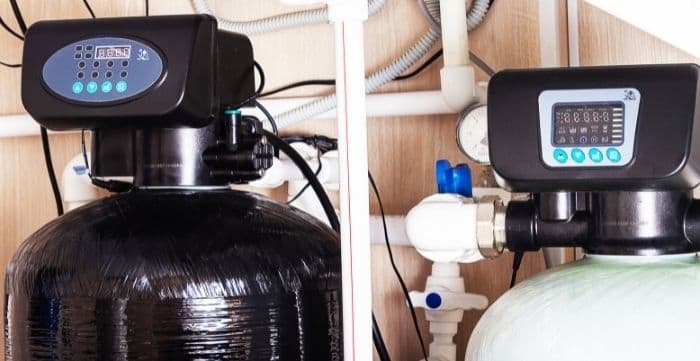
With more than 85% of the United States population relying on hard water for cleaning, bathing, and cooking, water softeners serve an important purpose. Hard water completely dries out skin and hair, leaves an unpleasant filmy soap scum across kitchen and bathroom floors, and damages most appliances. But, how does a commercial water softener work?
A water softener helps eliminate one of the most common water quality problems industries encounter; water hardness. Read on to learn more about how a commercial water softener works.
What Is Hard Water?
Hard water contains high amounts of dissolved magnesium and calcium minerals. These minerals are generally harmless to human health but contribute to the excessive build-up of calcium carbonate deposits in industrial equipment. As a result, machines function less efficiently, and the cost of heating water increases.
What Is a Commercial Water Softener?
A commercial water softener helps get rid of water hardness that usually causes scaling on household equipment, boilers, and other industrial heating and cooling systems. Commercial water softeners are able to do this by removing the excess calcium and magnesium deposits in the water, replacing them with salt.
There are numerous varieties of water softeners, such as the salt-based ion-exchange softener, which has two main parts that include:
- The brine tank: This is where salt is stored to be later mixed with water to form a brine solution.
- The resin tank: This is where water is flown at a rapid rate to completely flush out the magnesium, calcium, dirt, iron, and other sediments from water.
Also Read: Saltless water softener
Commercial Vs. Residential-Use Water Softeners
The main difference between commercial and residential-use water softeners is how often they regenerate and their size. During the regeneration process where soft water is unavailable, it is vital for the commercial use of water softeners to be sized. This should be done in accordance with the amount of water the unit uses daily.
Moreover, in the commercial applications of water softeners, there is a meter fixed on the control valve to measure the amount of water the system is consuming. But, once the resin tank cannot remove water hardness, it will have to be clean resin tank and regenerated. This regeneration cycle is typically done at night when soft water is not really needed.
Several water softener units are installed in other commercial applications of water softeners, where soft water is required 24 hours daily. The arrangement is done such that while one is regenerating, the other softens your water.
Other commercial units utilize multiple water softening systems to process all the water they are using daily. It is possible to wire four individual water softeners together into a single overall water softening system.
Water Softening Process
So, how does a commercial water softener work? The water softening process for industries requires incoming water to flow through a porous resin bed of consistent tiny plastic beads. These fine plastic beads are specifically constructed and treated such that each one is highly porous. Moreover, the surface area of these tiny plastic beads is permanently chemically adjusted to attract water hardening minerals.
The surface regions of the resin bed have an affinity for minerals with an electron charge of positive two or more, like magnesium and calcium. Other minerals with a similar electron charge may also be eliminated. To ensure the normal functioning of the water softening system, a thorough analysis of the incoming water is done. During the analysis, the incoming water is directed to a water softener vessel filled with the highly porous resin bed.
As the velocity of the incoming water gradually decreases, it will spread over a wider surface site on the resin bed. Once the water flows through the millions of tiny, porous beads, the minerals present in the water are attracted to the surface area of the bed. Finally, the water exits the resin surface areas – freed of opposing minerals and with minimal hydraulic head pressure drop.
Regenerating the Resin Bed
Since each surface area of each resin bed is often occupied with minerals, the efficiency of the water softener will gradually decline. Therefore, a complete industrial water softening system has to have the equipment to regenerate each bed in the resin.
Typically, there is a duplicate resin bed available in most industrial water softening systems that leaves adequate time for the initial resin bed to regenerate. Once water is diverted to the duplicate resin bed, the regeneration of the initial resin bed begins. The other option is to shut off the outflowing water during the regeneration cycle.
Conclusion
A large number of hotels, restaurants, nursing homes, manufacturing facilities, apartment buildings, and other commercial businesses require water softeners. For such businesses, the answer to ‘how does a commercial water softener work’ is very important. This is because the best water softener will enable you to run your business smoothly, prevent the build-up of scum in your pipes, and save your machinery from avoidable wear and tear.
